Death and the Gardener: An Iraqi Parable of Inevitable Fate
Reading Time: 11 min
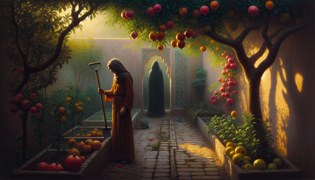
About Story: Death and the Gardener: An Iraqi Parable of Inevitable Fate is a Parable from iraq set in the Medieval. This Poetic tale explores themes of Wisdom and is suitable for Adults. It offers Moral insights. In medieval Iraq, a humble gardener learns that death cannot be outrun, only embraced.
Introduction
Under a honeyed sky, beyond the whispering walls of Mosul’s famed gardens, a humble gardener tended his flowers with steadfast devotion. The roses spread like blood across the low hedges, while the lemon trees quivered with dewdrops that trembled like distant stars. He rose before dawn’s first blush, calling, “By the Tigris, may the blossoms flourish!” His tunic clung damp to his skin, smelling of wet earth and pine resin. Birdsong wove through cypress boughs like a silken thread, and the gardener’s spade struck the soil with a soft, echoing clap, reminiscent of distant tambourines at a wedding feast.
One morning, as the sky faintly glowed with coral, he glimpsed a slender figure at the archway. Cloaked in sable, Death’s presence shimmered like heat upon cracked clay. The gardener froze, heart speeded like a startled gazelle. He tipped his sweat-dark hair and whispered a prayer in classical Arabic—"Inshallah we find mercy." Yet, no mercy came. The silent silhouette advanced.
His palms slick, he grasped the spade’s handle, as if that worn shaft could stave off eternity’s claim. The air smelled of coriander and smouldering wood. A distant call to prayer rolled from minarets, a solemn drum signalling time’s passage. The gardener’s breath came in ragged gasps, as though the world itself was folding. He chased Death through archways draped in jasmines. Dust swirled at his heels, waltzing like emerald fireflies in a lantern’s glow. Still, Death remained as inescapable as night. By Allah’s beard, he resolved to flee beyond these scented walls, certain that across barren sands and jagged hills he might outwit the silent visitor.
Thus begins our tale of pursuit and acceptance, tracing footprints from the fertile garden to desert dunes, from valleys where the river hums its ancient song to mountain caves cold as forgotten tombs. It unfolds like a tapestry woven with loss and hope, colours shimmering even as fate draws its last breath upon each thread.
1. The First Flight
The gardener fled at sunrise, dust drifting like pearlescent mist behind his hurried steps. His sandals kicked up fragments of faded brick, each a memory of seasons past. He darted through market stalls where merchants haggled over scarlet silks and glittering glass beads. The scent of cumin and fresh flatbread mingled with the clank of copper trays, yet his ears heard only his pounding heart. He dared a glance over his shoulder and saw Death’s cloak trailing like spilled ink across the sandstone.
Heart hammering, he clutched his spade like a shepherd’s staff, willing it to repel the silent intruder. He passed a murmuring fountain where water trickled over worn tiles, echoing like whispered secrets. Then he vaulted onto a narrow bridge arching above the Tigris, its waters reflecting the sky’s pale gold. Below, fish flickered like motes of quicksilver. The gardener whispered, “Gawwa qalbi, spare me.” But Death stepped onto the bridge’s far end, posture patient as though awaiting an old friend.
He turned aside and plunged into an orchard of date palms. Their fronds rustled like distant applause. The fruit hung in heavy clusters, sticky as melted honey. He brushed the rough trunks, feeling the grooves lace his fingertips, while the warm breeze carried faint laughter from children playing beyond the orchard wall. Yet Death advanced root by root, silent as night itself.
Reaching the city gates, he sprinted toward the desert beyond. The guards barely glimpsed his dusty cloak. He burst into sun-blazed dunes where heat rose in trembling waves. Every grain of sand felt like a fiery gem underfoot. The air hung thick with the musk of sunbaked stone. Still he fled, convinced that no mortal foot could outpace eternity’s stride. Occasional camel bells tinkled in the distance, a lullaby from wandering traders. But when he paused, wheezing, the sable form of Death emerged from between dunes, as inevitable as the next tide.
He sank to his knees, breath rasping, arms outspread in desperation. The desert breeze carried the faint tang of sandalwood. He swore by the fractured moon, by every whispered prayer in the dust, that he would not yield. Then, in that moment of shivering defiance, Death extended a pale hand. No words were spoken. Only the wind sighed across the sands like a nocturne.
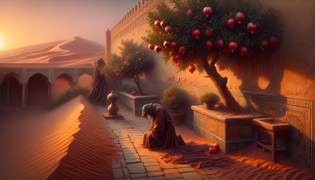
2. The Mountain Hermitage
At dawn’s edge, he climbed a jagged pass beyond the desert, each footfall echoing like a distant drumbeat. The rocks bit into his sandals, veins of quartz gleaming like frozen lightning. He sought sanctuary in whispers that mountain hermits might shield any weary soul—least of all one pursued by Death itself. Thickets of wild thyme scented the wadi, so he paused to inhale its cooling balm. A lark’s song spiralled overhead, as carefree as a child’s giggle at a wedding feast.
By mid-morning, he reached a crumbling stone hermitage perched on a precipice. Its narrow windows framed sweeping cliffs that plunged toward a serpentine river below. The hermit, clad in faded wool, offered him bread baked with olive oil, and their shared meal tasted of salt and smoky hearth. He pressed his calloused palms into the hut’s wooden wall—bare timber rough as an old man’s cheek. The hermit hummed an ancient psalm, voice low and steady.
But when twilight spilled across the peaks, the gardener glimpsed a dark silhouette upon the ridge. It stooped near rosemary bushes as if tending them. He felt hollow as a dried gourd, yet summoned courage to ask, “Who walks the heights at this hour?” The hermit whispered, “Look closely, son.” The gardener drew nearer and gasped as Death straightened, cloak spangled with pine needles.
Cold fear surged through him, sharper than any mountain gale. He bolted down the narrow switchbacks, heart hammering. The hermit’s echoing laughter trailed him like distant thunder. Loose stones skittered, clattering in protest. The tang of crushed juniper and the distant toll of a solitary bell reminded him that no shelter in earth or rock could bar that which must come for every living thing.
Collapsed beneath a juniper’s shelter, he pressed his forehead to a cool root, breathing in resin’s bitter sweetness. He murmured, “By every saint and prophet, depart.” But the hush that followed was broken only by his shivering breaths. At length he rose, limbs trembling like frayed linen, and vowed to fling himself into the river’s swift embrace below.
Yet even water’s swift current cannot drown the silent footfall of Death.
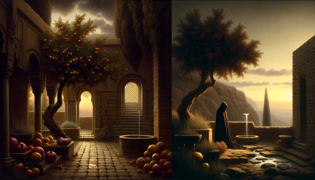
3. The River’s Mercy
Descending the pass, the gardener’s knees buckled where mountain met valley. Below, the Tigris wound through alluvial plains like a silver serpent. Palm fronds brushed the water’s edge, so he slipped in to wash dust from his arms. The river’s current murmured prayers as fluid as crystal. He pressed his hands into the cool flow, eyes closed, inhaling the river’s fresh tang mixed with goat cheese at distant stalls.
He pondered the hermit’s song, the echo of children’s laughter, and the hush of mosquito wings at dusk. This river had seen kings and caravans, heard poets recite odes beneath moonlight. It could surely shield him from Death’s relentless approach. He waded deeper until only his chin and tousled hair breached the surface. Water streamed from his beard like molten glass.
Yet as day waned, he sensed that sombre presence on the shore. Threads of lamplight flickered in the marketplace behind him. He swam toward the river’s centre, letting the current bear him like a leaf. Faint music drifted from nearby taverns: lute and daf in lilting rhythm. The gardener welcomed the melody’s comfort, convinced that death might not plunge into water as faith might not drown in despair.
But history’s pulse is not so easily eluded. A silent shape climbed onto a toppled reed raft. Even in the gloaming, he recognised Death’s hollow mask beneath the hood. It drifted toward him, steady as the river’s own course. Panic twisted the air in his lungs. He kicked toward the distant bank, every stroke a plea for mercy. The river slapped his sides, each wave a muted drum.
Finally he hauled himself ashore, shaking like a felled reed. His drenched tunic clung to his skin, salt crystals glittering like fallen stars. He sank onto a carpet of reeds, the stalks tickling his cheek with feather-light brushes. No path remained but to surrender. He looked at his trembling hands and sighed: “O fickle heart, at last be still.”
And in that silence, Death at last spoke.
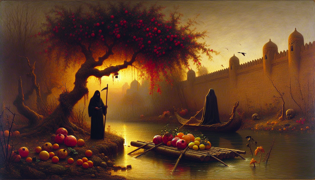
4. The Garden’s Embrace
The gardener rose with stars still glimmering above date palms. His bones ached like broken branches. He trudged back to the walled garden he once fled, inhaling the sweet musk of night-blooming jasmine. Olive lanterns flickered along the courtyard, casting quivering patterns on mosaic floors. The sky still wore the hush of midnight, pierced by a lone owl’s soft hoot.
At the garden’s centre stood a venerable lemon tree, its fruit pale as moons caught in green foliage. Under its canopy the gardener set a low wooden stool and cleaned the marble basin until it gleamed like polished ivory. He arranged dried figs, goat’s cheese, and flatbreads scented with nigella seeds on a brass tray. Then, with trembling palms, he plucked a single lemon and offered it to the approaching figure.
Death entered as quietly as dusk steals colour from the sky. The gardener inclined his head and murmured, “Welcome, friend I cannot flee.” Death’s skeletal hand hovered over the citrus, then accepted the offering. Together they sat beneath the lemon tree’s whispering leaves. The gardener poured rosewater into cracked porcelain cups. Steam curled upward, carrying the aroma of petals and honey.
No words were needed. In that silent communion, blossoms unfurled and nightingales stirred their throats. A cool breeze rippled through satin curtains hung between columns. The garden walls breathed with every flicker of torchlight. Even Death seemed less fearsome, as though warmed by the small hearth of shared hospitality.
By dawn’s palest glow, the gardener had grown calm as the still pool at the fountain’s base. He pressed his palm to the bark of the lemon tree and whispered, “Now I see—life’s sweetest fruit is born of our ending.” Death inclined its hood, and for a heartbeat, the world paused between blossom and wither.
When the first finches began their morning hymn, Death rose and drifted toward the archway. The gardener watched, heart steady as metal cooled in water. “Go in peace,” he called softly.
Death withdrew into the courtyard beyond, its cloak dissolving into the pale dawn. The gardener remained beneath the lemon tree, aware that though the endless pursuit had ended, life’s own tide would carry him forward, each breath a prayer embraced by fate’s gentle hand.
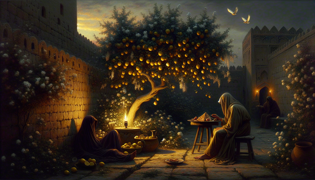
Conclusion
Long after dawn lit the world anew, the gardener lingered among rose petals and lemon leaves, every breath a testament to life’s fragile splendour. He no longer chased the silent falcon of fate nor flinched from its approach. Instead, he tended his flowers with gentle hands, aware that each blossom mirrored his own brief season. The garden’s colours—crimson, gold and emerald—shone brighter for the knowledge that they would fade.
The scent of jasmine and wet stone drifted on a mild breeze, carrying memories of his journey: the lantern-lit arches, the desert’s hush, the hermit’s psalm and the river’s lullaby. By facing Death beneath the lemon tree, he had discovered a truth as ancient as the Euphrates: to live fully, one must first accept the final reckoning. His spade no longer felt like a shield but a tool to shape beauty in fleeting moments, each turn of soil a prayer for tomorrow.
And when at last his own season waned, he asked only that his hands be laid upon earth he had loved. For in that gentle yielding, life and death entwine like twin vines climbing the garden wall. Through his acceptance, he had learned that death is not a thief in the night but an old companion, guiding every traveller home. In the hush after twilight, the garden whispered blessings for both the living and the departed. And the gardener, content beneath heaven’s dome, rested in the promise of every seed yet to bloom.

















